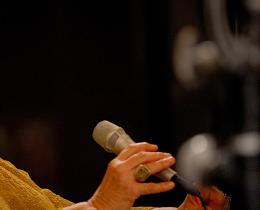Elizabeth: Your songs often don’t use words, but they carry as much meaning, depth, and emotion as the most beautiful, skillful lyrics. Is it a conscious choice not to use words? How can “nonsense sounds” evoke such an emotional response?
Bobby: I don’t think of them as nonsense sounds; I think of them as language beyond words. When we listen to improvisational jazz, or solo classical violinists, the way they phrase and inflect melodies feels vocal, like they’re talking to us. When I was figuring out how to perform solo, I wanted to move back and forth between bass riffs, melody, and harmony, so I often used sounds instead of—or alongside—the words of a song. I found that if I sang a line using the consonants, vowels, shadings, and inflection we recognize as human language sounds, people responded as if I were talking to them. There is a human connection even though there are no words. If I sing “you broke my heart, you left me flat,” everyone knows exactly what that means—they know the story. But if I sing a line that’s plaintive or wailing, people can experience their own set of emotions and their own story. Each of us might give that phrase a different meaning. It’s open to interpretation, and one song becomes a thousand songs. I love that. Inviting audiences to open up and hear things differently is an important part of what I do. But I still love to sing songs with words, too.
Elizabeth: Was your family religious? Was music part of your spiritual life as a kid? Do you consider it to be part of your spiritual life as an adult?
Bobby: My family was deeply religious, and music was one of the ways we prayed and worshipped. My parents were both professional singers and singing teachers, and my mother was the soprano soloist at our church. Music is still part of my spiritual life. Sometimes I sing my prayers. When I get audiences singing, I hope I’m helping them feel connected to something beyond themselves.
Elizabeth: You teach musical improvisation at Omega. Do you think improvisation is a skill that can help people in other aspects of life—at work, or at home with families and friends?
Bobby: Improvisation means coming to the situation without rigid expectations or preconceptions. The key to improvisation is motion—you keep going forward, fearful or not, living from moment to moment. That’s how life is. Remembering that life can be full of surprises is useful in any part of your life. You can try a new way of singing a song you’ve performed for years, a new way of showing your family your love for them, or a new recipe. Don’t just play the licks you know. We’re all improvising all the time—it’s good to recognize that and embrace it.
Elizabeth: Sometimes when I am writing I don’t feel as if “I” am writing. Rather, I feel something comes through me, that the words already exist and I am just catching hold of them. Do you have that experience? Are the songs already “out there” waiting for you to catch hold of them?
Bobby: Yes, I know that feeling. What I do is mostly made up on the spot, so I’m used to it, and I’m used to thinking about my options. I can catch an idea, stay with it, and let it develop. Or, I can let go and move on to the next thing. There’s always another idea waiting—another sound.
Elizabeth: You’re known for so many different kinds of music. You had an early pop hit with “Don’t Worry, Be Happy,” you’re an improvisational jazz phenomenon, you’re an orchestral conductor, and you’ve created some of the most sacred spiritual music that I’ve ever heard. When I first heard the way you put Psalm 23 to music, I was moved to tears. Why did you use the word “she” when speaking about God in that piece?
Bobby: The 23rd Psalm is dedicated to my mother. She was the driving force in my religious and spiritual education, and I have so many memories of her singing in church. But I wrote it because I’d been reading the Bible one morning, and I was thinking about God’s unconditional love, about how we crave it but have so much trouble believing we can trust it, and how we can’t fully understand it. And then I left my reading and spent time with my wife and our children. Watching her with them, the way she loved them, I realized one of the ways we’re shown a glimpse of how God loves us is through our mothers. They cherish our spirits, they demand that we become our best selves, and they take care of us.
Elizabeth: Years ago when you taught at Omega, I used to sit on the bench at the Omega basketball court and watch you play with your kids and my kids. You made all of the boys feel good just to be playing, even if they weren’t “good” at the game. That is what happens when you teach—you just seem to have a way of making people feel good. Is that part of the motivation for you as a musician?
Bobby: I think play and joy and feeling good deserve more of our time. I don’t see why adults are supposed to grow out of those things. If I have a mission it’s to make everyone who comes to my concerts leave feeling a heightened sense of freedom to play, sing, and enjoy themselves.
Elizabeth: Vice-President Al Gore once spoke at an Omega conference and we asked you to give him a musical introduction. You started improvising the Vice-President’s name: “Al Gore, Come on out. Al Gore, Come on out....” The whole audience starting singing with you. By the time Al Gore came out, he was smiling and singing himself. What you did relaxed everyone, and when the vice president started to speak, we were with him and grace was in the room. How does music do that?
Bobby: I don’t know. It’s pretty great, though. Music and play can take people out of their everyday worries and remind them of freedom and joy.
Elizabeth: Do you think music can heal us emotionally or physically?
Bobby: Yes, I do. When I was a kid, my mother took that very literally. When we got sick, she’d put us to bed and put music on to make us feel better. Even now, if I’m getting ready for a concert and I have a headache or I’m worried about something, I can usually sing my way through it. When I come off stage, I feel better.
Elizabeth: I’m a grandmother now. My grandson is two-and-a-half years old and is singing about everything. In his world, everything can be turned into a song. Everything has its own tune and lyrics. Each of his toy trucks has its own voice and accent and tone. You seem to live in a similar world. How are you able to teach that?
Bobby: You know, I don’t teach it. If I stand there, appreciating the world around me as full of amazing sounds and the possibility of new ones, I think that invites other people to see the world that way, too. I love sharing the experience of singing with people, and I love sharing my stories. But when it comes to teaching, I have a lot of help. At Omega, I surround myself with amazing singers and teachers who are each masters at helping students find their voice.
Elizabeth: There’s a nakedness to your music and to the way you perform—you are being exactly, unapologetically, purely who you are. Why is it so hard for us to be ourself? It’s what we’re drawn to in artists, it’s what we want from each other, that authenticity, but we keep ourselves hidden. How can we liberate ourselves from the fear of being who we are?
Bobby: I’m not a scholar or a psychologist, so I don’t really think about why. But I do think about what it means to sing to and with people, to offer music to them, and to ask them to spend time with me. I try not to “perform.” I try to come on stage and be myself, to sing the way I would in a room by myself, to interact with the audience the way I would relate to them if we were in my kitchen drinking tea and making up silly songs. Maybe the way to get past the fear of being ourselves is simply to try it more often.



